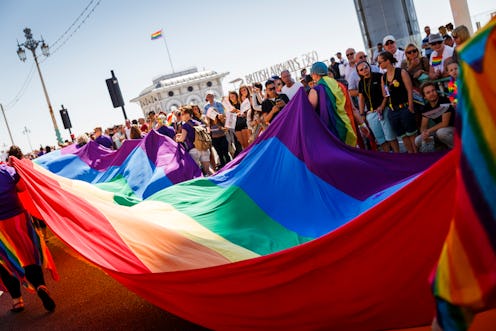
Too often, others decide what gender to refer to us by using assumptions based on physical appearance. But St Paul's Girls' School, a prestigious all-girls' school in London, is taking a stand against that. According to a new school policy, students can specify how they want to be referred to starting at age 16, and everyone in the school will respect that.
Although it is a girls' school, the students' written requests can say that they identify as boys, non-binary, or any other gender identity they want, and they will be able to stay. This is in alignment with the policies of some women's colleges like Wellesley, which allows trans men who entered while identifying as women to continue attending after they transition. Many colleges traditionally for women also allow non-binary people now.
"I see this as a social phenomenon, especially in London, which is much talked-about among school leaders," high mistress Clarissa Farr told The Sunday Times. "We consulted the pupils to find out what the issues were. Their main preoccupation has been to look after people who don’t want to identify as one gender or another." Ten students have already taken advantage of the new "gender identity protocol."
Unfortunately, though, the policy requires that students undergo counseling, speak with a pastor, and "preferably" involve their parents. This could become problematic because some parents and authority figures aren't accepting of kids' identities, so students may want to keep them private. Plus, people should be trusted to identify however they choose without anybody questioning it or forcing them to prove themselves.
Nevertheless, this is an important step in combatting our tendency to make assumptions about people's gender identities. The whole idea that someone looks "like a girl" or "like a boy" depends on generalizations about what girls and boys look like. There's also no such thing as "looking like" a non-binary person, so people should have the chance to let others know how they identify.
For similar reasons, the Kansas University library gives out pins for students to wear with their preferred pronouns, which can say "he/him/his," "she/her/hers," or "they/them/theirs." "Misgendering someone can have lasting consequences, and using the incorrect pronoun can be hurtful, disrespectful, and invalidate someone's identity," a sign hanging near them explained. It's true: Failing to honor the way somebody identifies contributes to our society's overall neglect of LGBT people.
"The gender fluidity of young people has become more pronounced in the last three to four years; there is a growing confidence in young people to challenge binary constraints,” said Schools Out UK chair Sue Sanders of the new St. Paul's policy. “This is really about organizations keeping up with how people are perceiving themselves — this is part of the whole process of exploding those gender boxes.”